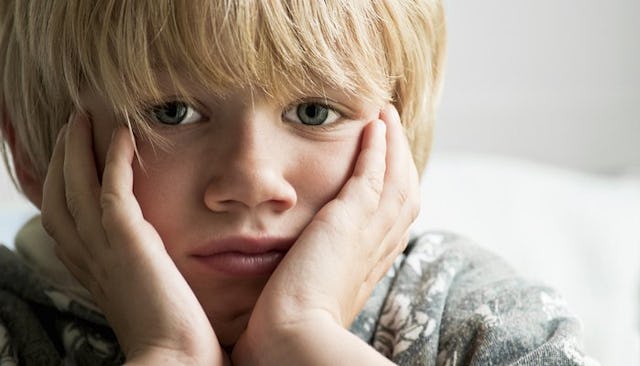Grown-Ups Need To Remember That Childhood Isn't Easy

Adults like to talk about preparing kids for “the real world.” We’ve grown fond of pejorative terms like “special snowflake” and accuse parents of coddling kids too much. The theory goes something like, “How are kids ever going to learn to handle real challenges if they expect a participation trophy every time they don’t win or if they can’t handle a little schoolyard teasing?”
I understand the desire to prepare our kids for whatever life throws at them, and I believe strongly in helping them develop coping tools and strategies to carry them through challenges. But I think we do kids a disservice by talking about adult life in the “real world” as if it’s immensely harder than childhood. It’s not. In fact, in many ways childhood is harder.
One thing grown-ups tend to forget is that kids are just starting to build their emotional muscles. You know how when you first start exercising, you get winded quickly, you can’t run very far or lift very much, and you spend the next three days sore in places you didn’t know existed in your body? Childhood feels a lot like that. Everything is new — disappointment, discouragement, embarrassment, heartbreak — and children feel those things deeply.
When I think back to my most embarrassing moments, very few images pop up from my adulthood. They’re overwhelmingly from my childhood. I haven’t felt intensely embarrassed since I was quite young because I learned through experience how to avoid embarrassing situations and how to handle them. But those initial childhood experiences are intense.
A lot of childhood is intense. Can you imagine constantly having people tell you what to do all day long, every day? Adults have weightier responsibilities than children, for sure, and lots of them. But we don’t have most of the people older than us bossing us around all the time. We have much more freedom in how we choose to use our time. We have the autonomy to make almost every decision for ourselves. We have to deal with the consequences of our decisions, but those consequences generally don’t include a guarantee of punishment for going outside the lines.
Adults also don’t have to put up with bullies to the degree that kids do. If a co-worker called me a foul name, pushed me to the ground, or threatened me in any way, I’d be on the horn to human resources faster than you can say “workplace harassment.”
Children are not only subjected to such abuses, either as victims or witnesses, they are also expected to figure out how to deal with them. Many schools have anti-bullying programs, but at least one study has shown that they aren’t particularly effective. Bullying in schools is a major, widespread problem, and kids often feel helpless to combat it. That is not easy.
Add in the amount of new information kids are assimilating every day, combined with the constant changes their bodies are going through, and it’s pretty clear that childhood isn’t a walk in the park. Their worries might seem trivial or simple compared to ours, but to them they are real and every bit as difficult to process. They experience the same emotions we do, often more intensely and without the life experience and perspective to work through them gracefully. Heck, even we adults don’t always work through our feelings gracefully. Why do we expect kids to do so on any consistent basis?
As parents, it’s our job to prepare our kids for adulthood, but also to help them through the ups and downs of childhood. The first two decades of life are doozies for all of us. Those years are filled with all kinds of new discoveries and joys, but they’re also fraught with challenges. Even healthy kids from loving, stable homes face difficulties — imagine how much harder it is for kids whose parents are going through divorce, or who are struggling with poverty, or who are dealing with mental health issues, or any other major upheaval. Childhood is more complex than we often give it credit for.
We don’t do kids any favors by coddling them, but we also don’t do them any favors by acting as if they’re being wimpy when they’re having a rough time. Children are children, not miniature adults. We need to realize that children are living in their own “real world” and acknowledge that their struggles are every bit as challenging for them as adult problems are for us.
Kids need our support and empathy in addition to our strength. I believe that offering both actually helps them build those tools they’ll need throughout their life. If we belittle their experiences, how will they ever feel capable of coping with “real” challenges? When we acknowledge that their challenges are real, when we validate their feelings, we help them gain the confidence that comes with overcoming them. That is where the real growth takes place.